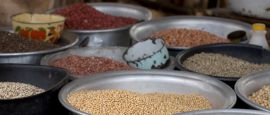Ghana Weather, climate and geography
Weather & climate
Ghana has a typically tropical climate due to its proximity to the equator and low elevations, with the entire country lying below 1,000m (3,300ft). Daytime temperatures are consistently high throughout the year, often approaching or exceeding 30°C (86°F), and humidity levels are particularly high along the coast. Nighttime temperatures generally drop to around 20°C (68°F), with the cooling effect more noticeable in the relatively dry north than in the humid south. The most temperate area is the highlands flanking the Volta Basin, which often enjoy pleasantly cool evenings.
There are two rainy seasons: March to July and September to October. Rainfall is highest in the south, with some areas receiving over 2,000mm annually, while the drier north typically gets around 800mm. The capital, Accra, and the coastline extending east to Togo and Benin lie within the Dahomey Gap, a savannah tract that receives relatively little rain and separates the Upper Guinean forests (west of central Ghana) from the Lower Guinean forests (southward from Nigeria to the Congo). A notable climatic phenomenon is the harmattan winds, which blow in from the northeast between December and March, carrying Saharan dust and reducing visibility to as little as 1km (0.6 miles).
Ghana is a fine destination to visit year-round, but the northern hemisphere winter (October to April) is particularly ideal. During this time, humidity is lower, the weather is generally dry, and there are fewer mosquitoes, reducing the risk of malaria. Dirt roads are also in better condition, and there is less chance of unexpected storms soaking travellers or their luggage. However, photographers may wish to avoid December's harmattan period, as it often brings dull light and grey skies.
Light and loose clothing are best for Ghana's humid tropical climate. Opt for light trousers or skirts made from natural fabrics like cotton, paired with a selection of cotton T-shirts. Pack plenty of socks and underwear, ideally also made of natural fabrics, to help prevent fungal infections. While Ghanaians are generally relaxed about dress codes, women should cover their shoulders and wear skirts that fall below the knee when visiting the predominantly Muslim northern regions. A single sweater or sweatshirt should suffice, as nighttime temperatures are rarely cold.
For footwear, bring sturdy walking shoes with good ankle support for exploring cities and nature reserves. Sandals or flip-flops are essential for hot days or casual outings. If you forget something, don't worry - Ghana has a thriving second-hand clothing market, and you can also buy affordable and beautiful outfits made from local fabrics.
Geography
Ghana is situated in West Africa, between latitudes 4°45'N and 11°N, and longitudes 1°15'E and 3°15'W. It is bordered to the north by Burkina Faso, to the east by Togo, to the south by the Atlantic Ocean, and to the west by Côte d'Ivoire. The Prime Meridian (0° longitude) runs through the port city of Tema, about 25 km (16 miles) east of the capital, Accra. Cape Three Points, the southernmost tip of Ghana, is the closest landmass to the oceanic intersection of the Prime Meridian and the Equator, which lies approximately 614 km (382 miles) offshore.
Ghana's geography is diverse, featuring sandy, palm-fringed beaches and lagoons along its coastline. Inland, grassy plains stretch outward, widening in the east, while dense rainforests dominate the south and west. Forested hills rise in the north, beyond which lie dry savannahs and open woodlands. The far north features a plateau averaging 500m (1,600ft) in elevation. In the east, the Akwapim-Togo ranges run parallel to the Togo border, creating striking landscapes. Most of the country lies within the Volta Basin, with the Black Volta and White Volta rivers flowing into Ghana from Burkina Faso. The construction of the Akosombo Dam in the 1960s created Lake Volta, one of the world's largest artificial lakes, which now submerges much of the river system.
Do you have any Feedback about this page?
© 2026 Columbus Travel Media Ltd. All rights reserved. No part of this site may be reproduced without our written permission, click here for information on Columbus Content Solutions.




 You know where
You know where